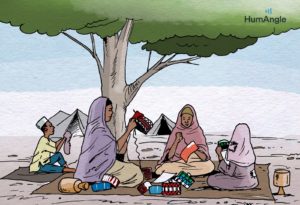IDP Diaries: ‘Our Children Sew Caps So We Can Survive’
Bintu Lawan’s children are the breadwinners in their household. They make and sell native caps to augment the meagre aid they receive. She is uncomfortable about it but she can’t go home, back to her farm, because of terrorist attacks.

We rely on the children for survival most times. It is the children that provide food for us when the one gotten from the government runs out. Our children sew caps so we can sell them and use the money. At night, they use torchlights so they can see what they are sewing.
I am Bintu Lawan and I am from Jarawa village, Borno State. When the fights with Boko Haram got worse in our village, we took the children and went to Rann. Things got worse in the three years that we were there. We used to fetch thatch from the bush and sell it to the men who made roofs. It was a way to survive. When things became unbearable, we moved.

There are several reasons we left Rann. We used to get a lot of aid, then Boko Haram started disturbing us. And when the Nigerian Airforce bombed us, things got worse. My husband was injured during the bombing. A lot of people died.
I feel for the widows and women whose husbands are in detention. It is some men here that assist them; else no one would assist them. Sometimes, they don’t even get food to eat.
I have eight children and feeding is a problem but with the cap sales, we are managing. We get one measure each of maize and rice, 30 cubes of seasoning, and three measures of beans every month. It is not enough but it is better than going back to my village and roaming around with the children as the crisis is still going on.
The governor is saying we should go back home but even the road back home is muddy and bad. There is no food there either. I am not going back again. I have eight children to look after. I cannot go back and, for those who would go, I pray it should be better for them.
We don’t get enough food here but it is better than going back home or going to Rann. We have been here for about three years now. The children will continue to sell caps to feed us.
(Additional reporting by Fatima Bukar and Yakura Kumshe)
Note: IDP Diaries is a first-person account by the subject themselves. The account has been translated for reading by HumAngle.
This is a multiple-part series; click here to read other IDP Diaries.
This report is a partnership between HumAngle Media and Premium Times Center for Investigative Journalism (PTCIJ) under the ‘Accountability Journalism & Investigative Reporting for Deepening Democracy and Development’ project.
Support Our Journalism
There are millions of ordinary people affected by conflict in Africa whose stories are missing in the mainstream media. HumAngle is determined to tell those challenging and under-reported stories, hoping that the people impacted by these conflicts will find the safety and security they deserve.
To ensure that we continue to provide public service coverage, we have a small favour to ask you. We want you to be part of our journalistic endeavour by contributing a token to us.
Your donation will further promote a robust, free, and independent media.
Donate HereStay Closer To The Stories That Matter




